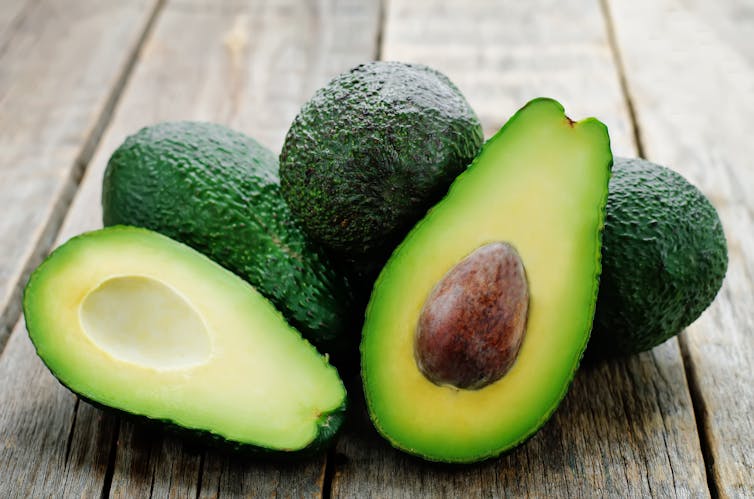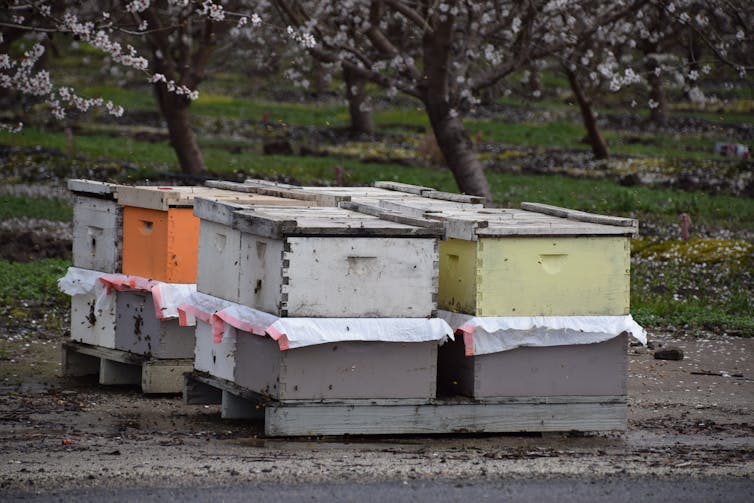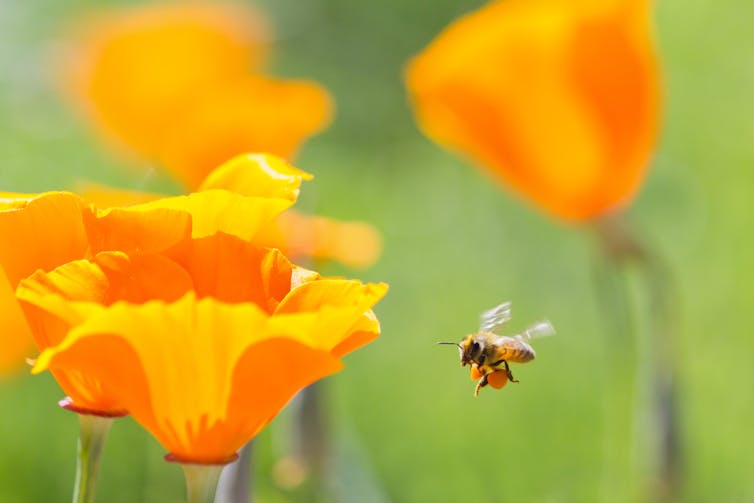
Nataliya Arzamasova/Shutterstock
Dominic Wilkinson, University of Oxford
A video recently doing the rounds on Facebook included a segment from the BBC comedy quiz show QI. The video asks which of avocados, almonds, melon, kiwi or butternut squash are suitable for vegans. The answer, at least according to QI, is none of them.
Commercial farming of those vegetables, at least in some parts of the world, often involves migratory beekeeping. In places such as California, there are not enough local bees or other pollinating insects to pollinate the massive almond orchards. Bee hives are transported on the back of large trucks between farms – they might go from almond orchards in one part of the US then on to avocado orchards in another, and later to sunflower fields in time for summer.
Vegans avoid animal products. For strict vegans this means avoiding honey because of the exploitation of bees. That seems to imply that vegans should also avoid vegetables like avocados that involve exploiting bees in their production.
Is that right? Should vegans forego their avocado on toast?
Defending avocados
The revelation that avocados might not be “vegan-friendly” could seem to be a reductio ad absurdum of the ethical vegan argument. Some people might point to this and claim that those who are vegan but still consume avocados (or almonds and the like) are hypocrites. Alternatively, this sort of news might lead some people to throw up their hands at the impossibility of living a truly vegan diet, and so to give up. Pass me the foie gras someone …
However, one initial defence for vegans is that this is only a problem for certain vegetables that are produced commercially on a large scale and which are dependent on migratory beekeeping. In places such as the UK, this practice is still (as far as I can tell) uncommon. Locally sourced butternut squash would probably be fine (although you could never guarantee a bee kept in a hive hadn’t pollinated a crop), while avocados and almonds (including most almond milk) sourced from California might be a problem.

Sonia Cervantes/Shutterstock
Another answer might depend on someone’s view about the moral status of insects. Commercial beekeeping may injure or kill bees. Transporting bees to pollinate crops appears to negatively affect their health and lifespan. But some may question whether bees are capable of suffering in the same way as animals, while others may wonder whether bees are self-aware – whether they they have a desire to continue to live. If they do not, some philosophers argue that they would not be harmed by being killed (others, such as Gary Francione, would beg to differ).
Depends on your ethical rationale
The more important general response is that whether or not migratory beekeeping is a problem depends on your ethical rationale for being vegan.
Some vegans have a non-consequentialist justification for being vegan – they wish to avoid acting immorally through their diet. This could be based on something like the Kantian rule of avoiding using another sentient being as a means to an end. Or they may have a rights-based view, according to which animals (including bees) are rights holders. Any amount of rights violation is wrong under this view – it is simply not ethically permissible to use bees as slaves.
Other vegans choose not to eat meat or other animal products for consequentialist reasons – they wish to minimise animal suffering and killing. This ethical argument might also have trouble with migratory beekeeping. While the amount of suffering experienced by an individual bee is probably small, this would be magnified by the very large number of insects potentially affected (31 billion honeybees in the Californian almond orchards alone). A vegan who chooses to eat almonds or avocados is not doing what would most reduce animal suffering.

Sumikophoto/Shutterstock
However, a different, (perhaps more practical) ethical rationale that might underlie a decision to go vegan is the wish to reduce the animal suffering and killing and environmental impact involved in food production. Migratory beekeeping also has negative environmental effects, for example, through the spread of disease and effect on native honeybee populations
Taking this view, dietary choices that reduce animal exploitation are still valuable even if some animal exploitation would still occur. After all, there is a need to draw a line somewhere. When we make choices about our diet, we a need to balance the effort we expend against the impact on our daily life. The same applies when we make choices about how much we should donate to charity, or how much effort we should make to reduce water consumption, energy use, or CO₂ emissions.
One ethical theory for how resources should be distributed is sometimes called “sufficientarianism”. Briefly, it is the idea that resources should be shared out in a way that is not perfectly equal, and may not maximise happiness, but at least ensures that everyone has a basic minimum – has enough. In another area of ethics, there is sometimes discussion of the idea that the aim of parenting is not to be the perfect parent (we all fail at that), but to be a “good enough” parent.
Taking a similar “sufficientarian” approach to the ethics of avoiding animal products, the aim is not to be absolutely vegan, or maximally vegan, but to be sufficiently vegan – to make as much effort as feasible to reduce harm to animals for the sake of our diet – we could call this a “vegantarian” diet. For some people this may mean choosing to avoid Californian avocados, but others may find their personal ethical balance at a different point. What is more, accepting and embracing all these variations may provide room for more people to adopt or sustain a vegan lifestyle.
Pass me the avo on toast, someone.![]()
Dominic Wilkinson, Consultant Neonatologist and Professor of Ethics, University of Oxford
This article is republished from The Conversation under a Creative Commons license. Read the original article.

This is very interesting: it shows that being consistent is much more difficult than one might think; I had a similar reaction when I found out that even beer may not be considered ‘vegan’, in a sense of the term. For an ethical vegetarian like me, here the crucial question is strictly empirical: how much does each bee suffer? But I do not think that it matters much how many bees suffer, if each of them suffers only minimally. You write: “While the amount of suffering experienced by an individual bee is probably small, this would be magnified by the very large number of insects potentially affected”. But I do not think that the number of insects affected would magnify the harm in any ethically relevant sense of ‘magnify’, since suffering is always an individual experience (like all experiences, unless we use metaphorical language). 1 bee suffering only minimally is better than 1,000 bees suffering only minimally, of course, but the difference is not significant enough in my view: to each bee suffering only minimally, it does not really matter whether other bees also suffer or not. If the level of suffering is very very minimal, then in my view these practices are permissible even if they affect millions of bees. And if the level of suffering is significant, then in my view these practices are not permissible even if they affected, hypothetically, only 1 bee.
HI all,
I have been Vegan now for 45 years and over the years found these reports do not to not give the whole picture
I have read some interesting scientific studies on line. One suggests that scarcity of consistent food supplies in itself can cause stress and potentially starvation. Especially in areas of agriculture where certain fruit trees all blossom together and then nothing . These studies suggest that even though there is a degree of stress involved in the transport, to then be released in an environment of abundant food supplies can counteract the stress involved in the journey. Compared with control tests of a static Bee with less consistent food supply the transported Bee can often be healthier. I have also read in depth studies on the side of the Bee keepers who wish their Bees to survive journeys with the minimum stress, even if motivated by finance they do not want their Bees to become unhealthy and die
We do not live in a perfect world. We humans suffer daily stress in our environments such as possibly unsuitable employment etc you may say we have a choice but really we don’t always have a choice as the only way to feed our family is to work
It would be wonderful if we all (including animals, birds, fish and insects etc) had no stress, sufficient food, shelter etc for our needs, but it isn’t always possible.
All we can do is do our best
We cannot live without causing some suffering, everyone should have in their mind the degree of suffering that they are comfortable with. Almost everyone vegan or not will disagree with each other’s ethical standpoint, this then requires a degree of tolerance between individuals regarding theirs and others dietary and lifestyle choices. The vegan society’s definition of a veganism is ”A philosophy and way of living which seeks to exclude—as far as is possible and practicable—all forms of exploitation of, and cruelty to, animals for food, clothing or any other purpose; and by extension, promotes the development and use of animal-free alternatives for the benefit of humans, animals and the environment. In dietary terms it denotes the practice of dispensing with all products derived wholly or partly from animals” You will notice that the term ”as far as is possible and practicable” is included, this of course waters down the definition. There will be some who find this flexibility unnerving, especially those who regard veganism as a faith, or dogma. Of course faith and dogma are attractive to many who are negotiating the ethical quagmire that is life for an identity for themselves, or to feel that they belong with others having similar persuasion. I am a little deviant from those vegans who put speciesism before humanitarianism, I believe that humans should be spared suffering at the expense of all other animals. I try to preserve all animal life, but I have no difficulty in choosing to kill tics that pester my dog. I would feel less upset about the death of insect than of a chimp or a cow or pig. I think other vegans probably would have the same opinions, but many are reluctant to have this discussion, I suspect because there is a discomfort with being deviant or giving real consideration of the ethics. Perhaps also because they might then be a little less distinct from those other people who might eat honey, or eggs, or wear wool. I don’t eat meat or fish or dairy, but I would eat honey. I still wear leather shoes. I respect those who choose to avoid plastics, or try to reduce their environmental impact in other ways. It is difficult to equate the environmental impact of clothes made from natural materials vs. plastics. I accept that there are some people living in some underdeveloped parts of the world can only exist practicably by using other species. My own position is right only for me, and is based on my own life experiences and ethics.
Why limit it to avocados and almonds? That to me seems to play into the idea of perfectionism or dogma preferred by utilitarian considerations of veganism rather than the opposition to exploitation that rights advocates prefer, and incidentally is consistent with the origins of veganism.
The issue here is that the use of bees in this way is wrong. Yet how do we negotiate a non-vegan world scenario such as this one and remain vegan? I think simply it is difficult to know and avoid the types of products that are pollinated in this way at the present time, and until there is sufficient concern for exploiting animals generally and also bees in this way it is going to be difficult to deal with it meaningfully. So it falls into the “as far as possible and practicable category”. So consuming avocados and almonds would be vegan.
Utilitarians or effective altruists would more likely cast veganism as a puritanical pursuit and as it is not possible to be “perfect” then it is ok to consume and exploit animals in a variety of ways, thus leaving speciesism unchallenged. This in itself is a reflection of speciesist dogma and to me would demonstrate an unnecessary defence of injustice.
Comments are closed.